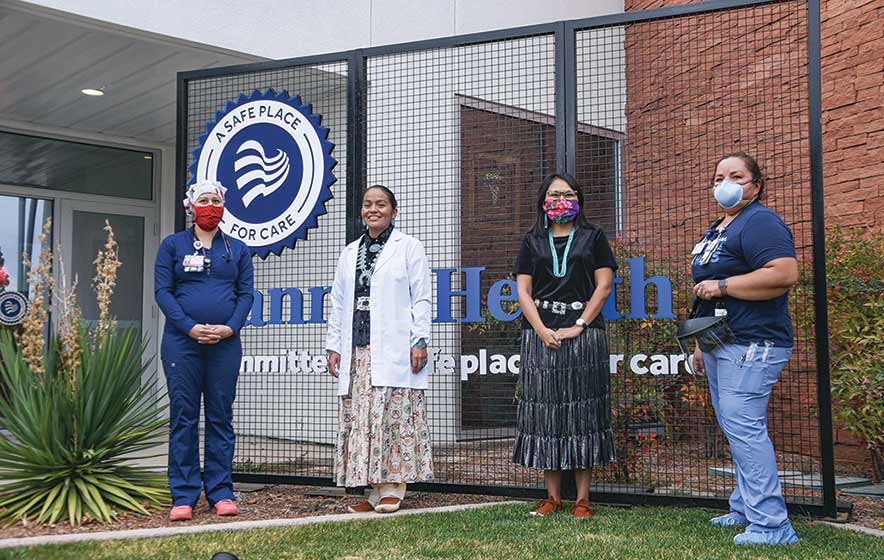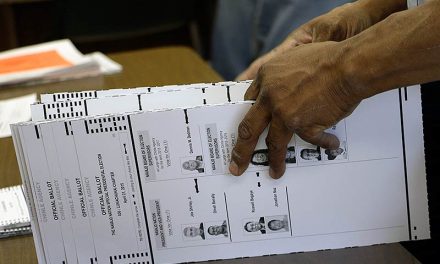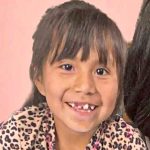
‘It’s in our blood’: Meet the Diné frontline workers at Page Hospital

Special to the Times | Krista Allen
Diné frontline workers, left to right, Katelynn Hunt, Brittany Fat-Denatsosie, Lavalerie Tsinnajinnie, and Danielle Manygoat outside Page Hospital in Page, Ariz., where they are part of the medical staff. Brittany recently became the primary care provider at Canyonlands Healthcare.
By Krista Allen
Special to the Times
DÁ’DEESTŁ’IN HÓTSAA, Ariz.
“K’adę́ę hózhǫ́ǫgo naasháa doo,” said Danielle Manygoats while facing east at the crack of dawn.
“K’adę́ę hózhǫ́ dooleeł,” she said as she prayed Dinék’ehjí to the holy people outside her home last Wednesday morning. “Shimá nahasdzáán, shi Taa’ yádiłhił. T’áá ałtso Diyin nilíinii, t’áá ałtso Diyin Dine’é ….”
Manygoats, 39, prays every morning at dawn and then again when she’s traveling to work at Page Hospital where she is a patient care assistant.
She prays not only for her family and friends, but also for herself and for her colleagues. Page’s health care workers on the front lines of the coronavirus pandemic.
“A lot of the protective words – you’re giving your blessings and you’re using those words,” she explained. “Because in Navajo, when words come out, they’re a lot more powerful.
“You’re not just praying to one (divine being),” she said, “you’re praying to the sky, the air, the moon – everything around you because … your body is water, your body is air, pretty much every single element that you can think of.
As a public service, the Navajo Times is making all coverage of the coronavirus pandemic fully available on its website. Please support the Times by subscribing.
How to protect yourself and others.
Why masks work. Which masks are best.
Resources for coronavirus assistance
“And you’re speaking to them and asking them for protection,” she said. “You’re acknowledging them. That’s where those words become power because they hear you.”
Being Diné, Manygoats said, one does not sleep past sunrise. Diné should be up before daybreak to do chores, tidy up the house, and feed the animals before starting the day. These things are strength, power, and blessings.
“In the morning, I like to pray,” she said. “Every single morning, it’s a ritual, it’s a habit, it’s a must, just making sure that the day’s going to go (well). Prayers for my co-workers who I get to work with on a daily basis, praying for their good health and making sure nothing bad happens (and) at work, that we’re able to get through the day safe and we’re able to go home to our families.”
When Manygoats is not working, she still gets up before dawn to pray for her colleagues who are constantly in harm’s way, risking their lives to fight the pandemic they hoped would never reach them.
“Having that prayer for them and giving them that added protection has become a way of life,” Manygoats said. “It’s become an everyday prayer. And when you get (to work), blessing yourself with (ch’il dích’íí’ii and tá’dídíín) to protect yourself against anything possible.
“Having those blessings every single day is a ritual and it’s something that has to be done,” she said. “It’s not something you want to do, it’s something that you have to do.”
Manygoats is one of Page’s Diné health-care professionals who are risking everything to care for COVID-19 patients and non-COVID patients – the pandemic’s hidden victims of the virus.
Both Page Hospital and Canyonlands Healthcare are honoring Diné health-care professionals for Native American Heritage Month. Each of them plays a vital role and helps to power their respective facilities.
Each has lived through the grueling first wave of COVID-19 and they are bracing for a second wave.
Each of them has a story of how they went to school and chose to come home to Diné Bikéyah, what they learned, the language they speak with non-English speaking Diné elders, and how the virus changed their lives.
When the Navajo Times showed up at Page Hospital to meet with four Diné professionals on Nov. 6, two of them showed up in their scrubs along with protective gear – mask, visor, shoe covers, cap and gloves.
Another two arrived in traditional outfits adorned with their finest béésh łigaii and dootł’izhii and moccasins, showing their resilience, dreams, and what education can do.
Danielle Manygoats
Manygoats’ late grandfather was a Navajo Nation Council delegate and a hataałii with the ability to heal and teach.
“A lot of the stories that my mom, my family used to tell us about him –helping to heal people – it’s in our blood, in our family,” said Manygoats, who is Bįįh Bitoodnii and born for Áshįįhí.
She is originally from Goldtooth, Arizona, in the Tsékǫ Haagééd area.
“So in my family, you’re either there to help heal people when you go into the medical field or you’re there to help protect people (by) joining the armed forces or (becoming) a law enforcement officer,” she said.
This is the reason, she says, she chose a career in medicine, alongside her siblings, one of whom is a nurse at Tuba City Regional Health Care.
Manygoat started her career at a home health and hospice in Phoenix and then signed over to Banner Desert Medical after three years.
After another three years, Manygoat went home to be closer to her mother, Francine Manygoats, to her family and Diné culture and traditions, some things she missed while living away from home.
She said it was rare to hear Navajo spoken in her workplace because not many Diné patients came through the doors.
But all that changed when Manygoat started two years ago at Page Hospital, where she also serves as a Navajo translator/interpreter to ensure Diné patients understand their medical needs and care.
“There are some words that don’t necessarily translate into English and there are some English words that can’t translate into Navajo,” Manygoat explained. “And then translating that (medical terminology) into the Navajo perspective and the Navajo teachings, cultures of philosophy, it’s like having to bring that balance between the patient and the (physician).”
Careful not to say taboo words and subjects with Diné and Native patients, Manygoats said she always tries her best to translate those words and subjects in a different way.
“And a lot of the (Native) patients better resonate with people who are able to speak on their level, speak on their behalf to understand them in a way you can’t get with a (non-Native) translator,” she added. “But being there in person, going back and forth between the physician and the patient, it’s something that’s irreplaceable by technology.”
Lavalerie Tsinnajinnie
For the health-care workers on the front lines, the strain comes in a wave of nexts – next patient after next after next. One of those patients was Lavalerie Tsinnajinnie’s younger sister, Marissa Tsinnajinnie.
“When we first heard of the virus, the whole thing was, ‘Are we going to see it? Are we going to experience any of that?’ Little did I know it would be,” said Lavalerie, 40, a registered nurse at Page Hospital. “Personally, I’ve been affected by it. I think a lot of people have lost a loved one to it.”
Marissa, 34, was healthy and had an active lifestyle. She worked alongside her elder sister at the hospital as a patient care technician. She was infected with COVID-19 in April, the month after the virus hit the Navajo Nation.
“She came to the hospital here, I was working that day,” Lavalerie said in an emotional interview. “I was with her when she got intubated and we flew her out to a different facility (where) she was on the ventilator for almost four weeks.
“I was there with her when they took her off the machine and that was in May,” she said. “She passed away. It’s very – it’s a lot.”
Lavalerie said she uses her experience today to teach others to wear a mask for protection as well as to keep hand-washing and social distancing as much as possible.
“The virus doesn’t matter if you’re healthy even though it’s said, ‘You’re more vulnerable if you have comorbidities,’” she said. “I tell everybody straight across the board: It doesn’t matter. The virus doesn’t care if you’re healthy. Just follow the (Centers for Disease Control and Prevention) guidelines that are set for you. It’s been a rough year for a lot of people.”
Nothing felt right for Lavalerie and her family after Marissa died as they experienced tremendous loss, pain and grief.
But what kept her going and gave her the courage and the strength to return to work to care for others, she said, was her family and their spontaneous outpourings of support.
“It’s hard at times but I know they’re there and they’re willing to watch my daughter for me when I go to work,” Lavalerie said. “They’re willing to sit with my (eldest) daughter all day doing online school. All these things that I need done, I know that they’re there, that they can help me.”
Lavalerie is Tábąąhá and born for Bįįh Bitoodnii. She grew up in nearby Western Navajo and in Page, where she attended elementary through high school and where she started taking college courses at Coconino Community College before she transferred to Northern Arizona University.
Lavalerie in 2015 earned a bachelor’s degree in nursing, after which she started her career at Tuba City Regional Health Care as a registered nurse in the adult care unit.
“I was there for almost two years before coming here,” she explained. “But I’ve been with Banner Health over a year and half now. Right now, I’m working as a registered nurse on the medical-surgical unit and that’s my primary job.”
In her job, Lavalerie works with patients of all ages and ethnic groups, including some Diné who speak only Navajo, which is the primary reason she chose a career in medicine.
“I wanted to be that link between a patient who speaks only Navajo and a (physician) who doesn’t speak nor understand Navajo,” she said. “Growing up, watching my grandparents, just kind of seeing that interaction where the patient isn’t fully able to convey what they are trying to tell the doctor, that language barrier. That’s the reason why I went into nursing.”
Like her colleague Danielle Manygoat, Lavalerie speaks fluent Navajo and she also serves as a Navajo translator/interpreter, which she compares as being in two different worlds.
“You have the traditional Natives, like Navajo, and then you’re incorporating Western medicine and trying to combine both of them to best benefit the patient,” she explained. “The patients who speak only Navajo, I know it’s good for them to hear the Navajo language being spoken to them.”
Shiyázhí, she’awéé, is what her Diné patients say to her in return.
“When they say that to you, it makes you feel good,” Lavalerie said.
Brittany Jamaica Fat-Denatsosie
The 30-year-old primary care provider at Canyonlands Healthcare has always been a leader rooted in community. A leader who was raised by her parents, Julius Fat and Virginia Arizona-Fat, a woman rooted in community.
Brittany Jamaica Fat-Denatsosie has lived an education life while balancing work and family and raising her daughter, Kaylynn Denatsosie.
Now, she’s living her dream: Caring for the Page and Navajo communities.
Brittany is Áshįįhí and born for Lók’aa Dine’é. She grew up in LeChee, Arizona. She was residing in San Diego County, California, where her husband, Jonathan Denatsosie, a former U.S. Marine, was stationed at Camp Pendleton.
“That’s where the whole story started with me wanting to come home,” Brittany said. “(Jonathan) wanted to re-enlist and I told him I didn’t want him to because I missed home so much, including my family and my horses. I told him I wanted to go home and that I would start working and start school.”
Jonathan had only six months remaining in the service when Brittany and then-1-year-old Kaylynn moved home to LeChee, and she started work as a certified nursing assistant on the medical-surgical floor at Page Hospital and then enrolled as a part-time student at Coconino Community College.
“I was worried, so I started part-time at the community college,” Brittany said. “After my first semester, I got really good grades like, ‘Wow, I can do this!’ And I can handle being at work and going to school and taking care of (Kaylynn).”
When Jonathan left active duty, he returned home and enrolled at CCC too.
When Brittany graduated with an associate in pre-health careers, she applied for a number of scholarships and then started looking into nearby nursing schools. She was accepted by NAU’s School of Nursing and CCC’s Nursing Program.
“I needed help with money and working and trying to figure out what would be my next step because I knew that we would be moving if I wanted to go to nursing school,” said Brittany, who was awarded the prestigious All-Arizona Academic Team Scholarship, which provides free tuition for 60 credit hours at one of the three state universities.
“At that point, I knew,” she said, “my first option would be to get my bachelor’s in nursing at NAU.”
At NAU, she was admitted into the American Indian Nursing program and housed at the Good Shepherd Mission in Fort Defiance.
“I stayed per diem with Page Hospital and at the same time, I was able to move my family to Gallup and commute from there to Window Rock (for an entire year),” Brittany explained.
During her second year, Brittany moved her family to Flagstaff to finish nursing school on the Lumberjack campus. When she graduated with a bachelor’s in December 2016, she moved her family home once again and continued working at Page Hospital in addition to studying for the National Council Licensure Examination.
“I wanted to further my education and the thing that helped me decide that was (seeing) a couple of Native American health care providers throughout my time doing clinicals in Gallup, in Tuba City, and at Flagstaff Medical Center,” she said.
Influenced to further her education, Brittany took a leap of faith and decided to apply to NAU’s family nurse practitioner-graduate nursing program as a part-time online student after passing her NCLEX exam.
“I felt I had a chance,” Brittany said. “I graduated with at least six or eight other Diné and Natives. My family, my daughter, my husband, and my parents, they’re very supportive. They’ve always said, ‘Further your education.’ They were used to me going to school.”
While working full-time at Page Hospital, Brittany graduated three years later with her master’s in May 2020.
Brittany recently became the new primary care provider at Canyonlands Healthcare in Page. She said her entire family keeps her motivated.
“We pray lot,” Brittany added. “We pray for this all the time. That’s what keeps me motivated. My culture, my religion, the patients I see.
“That’s what brightens my day,” she said. “It touches my heart when I’m able to help somebody, helping them with their health and their improvements. Those are motivating for me too.”
Katelynn Hunt
She knew immediately what kind of a nurse she wanted to be after understanding how complicated and sensitive death is for a Diné family.
Katelynn Hunt, 25, who is Tooh Dine’é and born for Tł’izíłání, understood this when she spent a year working for in home health at a hospice.
“I learned a great deal about how Navajo view death, what that means to them and their family,” Hunt said. “I know that death is taboo to talk about and I had an experience on the floor at (Page Hospital) where we had a patient that was on hospice care and they were admitted to the hospital, just for comfort care to pass … and not in the family’s home.
“I was put in a unique position where I understood how complicated death and dying was and how sensitive I needed to be about the topic,” she said.
Hunt is one of the youngest registered nurses at Page Hospital. She always knew she wanted a career in the medical field after seeing health issues affecting some Diné in Tódinéeshzhee’, where her father grew up.
“Just as a kid, I recognized that a lot of my family members had issues or problems with diabetes or kidney (failure) and liver issues,” Hunt explained. “I just really wanted to make a difference.”
When Hunt was a child, she had asthma exacerbations, or attacks, that often sent her to the emergency room. So she wanted to change that.
“I wanted to make sure that I could be the positive difference, that I could be the better experience by making sure that the kind of nurse I wanted to be was going to be someone who would be advocating for every part of my patient,” Hunt said. “It just made me very sensitive to other people’s needs. And there’s a really strong need in the Navajo Nation.”
Hunt lives in Page with her husband and 9-year-old daughter. She added that working with her Dine’é has been a positive experience even though she’s not fluent in Navajo. She is working to perfect her speaking ability by the time she completes her family nurse practitioner-graduate program.
“My goal is to be fluent in Navajo,” Hunt said, “so that when I become a family nurse practitioner, I would be able to speak to Diné patients in Navajo. It’s my goal to become a family nurse practitioner and then come back to serve the Navajo community.”
Working with Diné patients and nearby Diné communities, she said, is very important for her, as well as bridging the gap between her two cultural and traditional backgrounds.
“And just working as a nurse,” she said. “It’s really easy to see how things can be missed for Navajo people, including being culturally aware and competent, and having respect for that and including that in your care.”








 Highway 264,
Highway 264, I-40, WB @ Winslow
I-40, WB @ Winslow